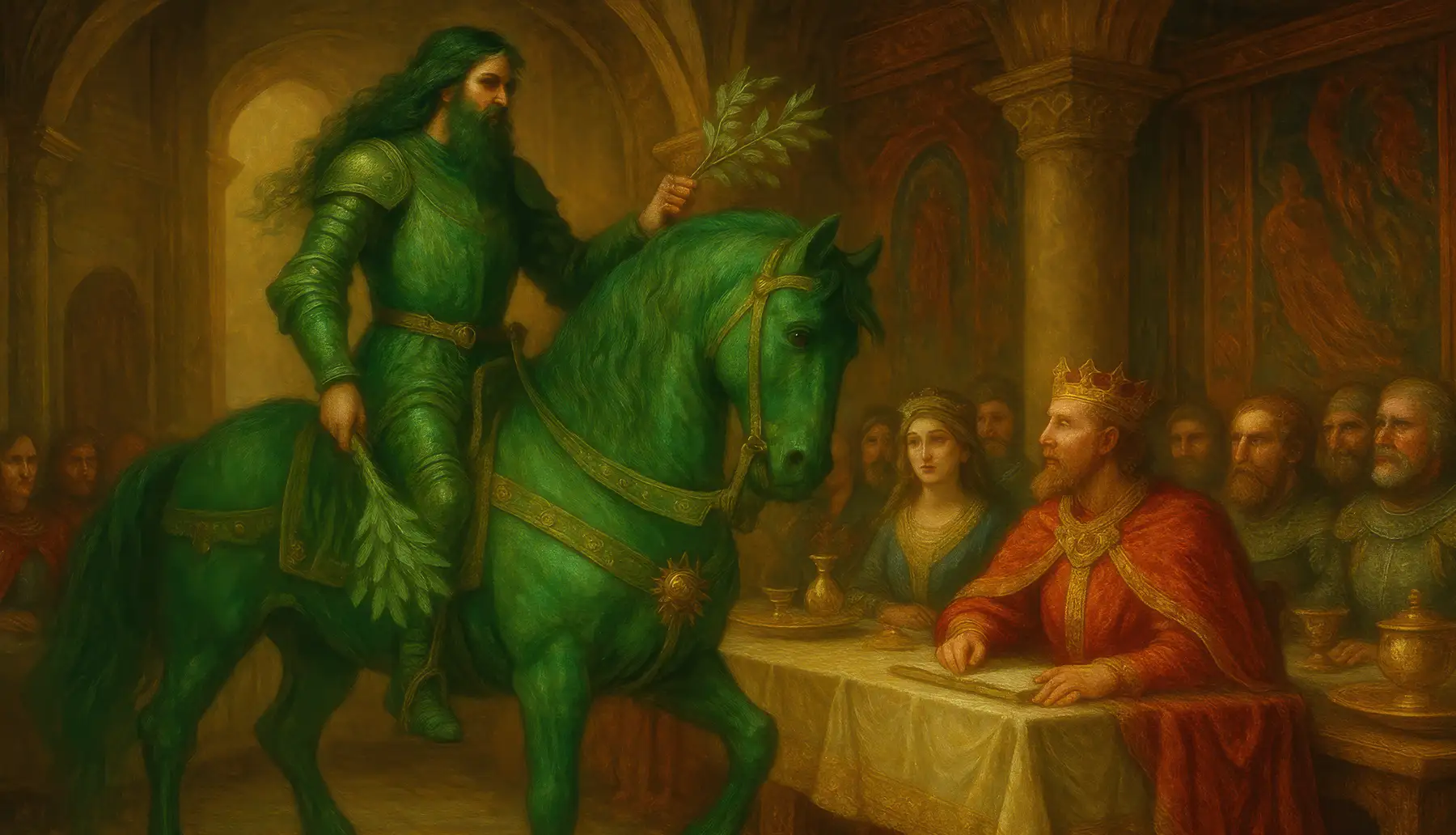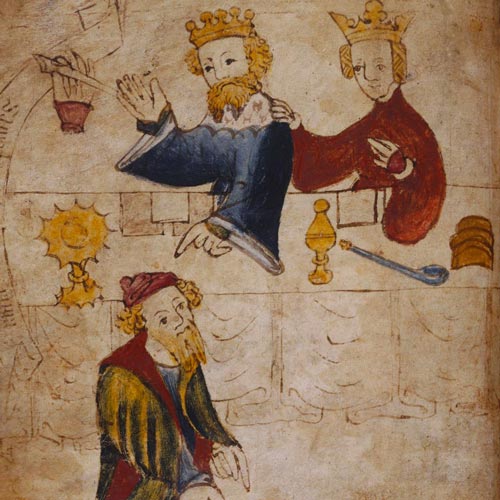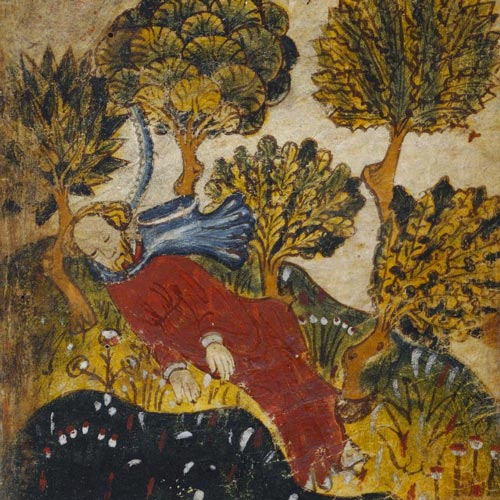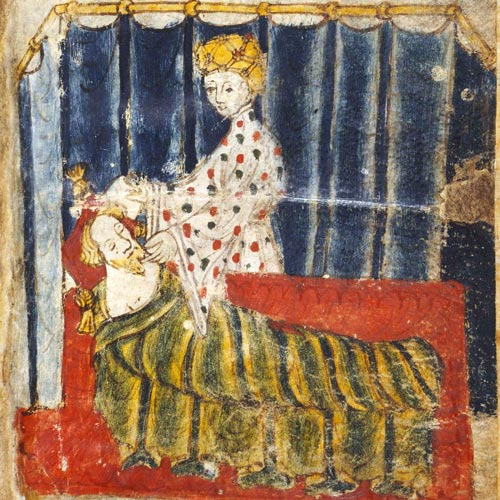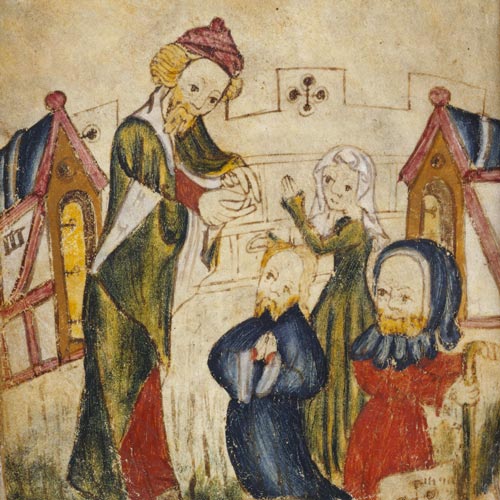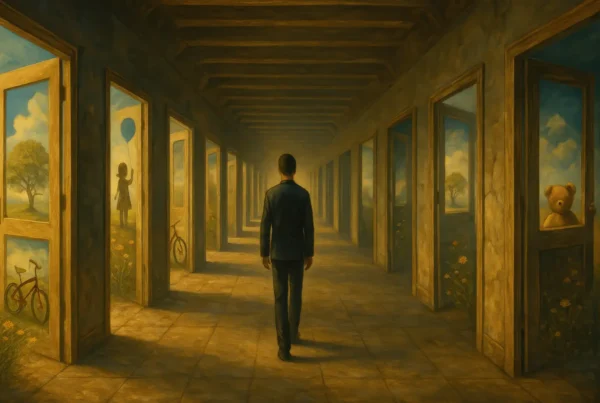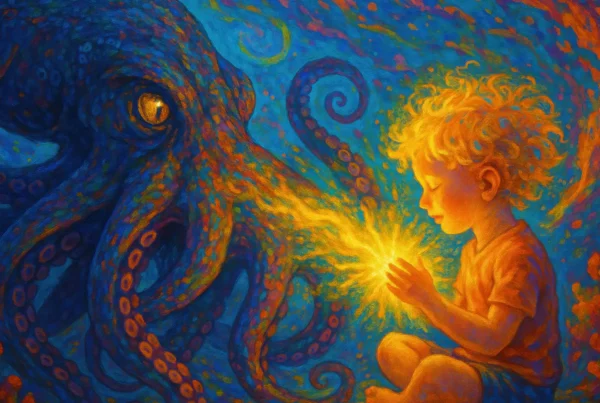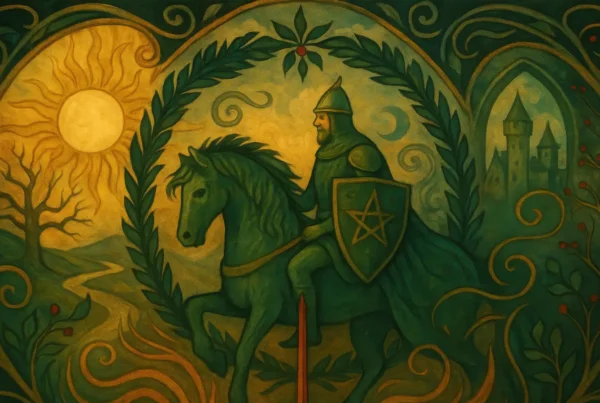BOOK YOUR WORKSHOP TODAY
All posts published here are presented as casual conversation pieces to provoke thought in some direction or another, they do not necessarily represent fixed opinions of the Inner Council, as our work exists beyond the spectrum of bound statement and singular clause.
Syr Garwayne & The Green Knight
This article is in two parts, the first is the story of Sir Gawain and the Green Knight rewritten in a shorter form, giving an idea of the plot. The second article is focused on the interpretation of myth and motif in the story and also references to other Arthurian poems and tales. If you would like a copy of the original manuscript, please get in contact.
Images from the original manuscript
The story
I
King Arthur and Queen Guinevere are celebrating New Year’s Day with a great feast in the dining halls at Camelot. Accompanied by all the great knights of the round table. King Arthur refrained from eating until all others had been served. He also had a custom not to sit and eat until a story had been told that both humoured him and made a great impression on the company of his knights and ladies. As the food was served and the seasonal music came to an end, an impressive figure abruptly appeared at the door in a grand silhouette and entered on horseback. Large and impressive, this creature adorned in the most fantastic of clothes and ornaments, deep green with gold detail, was without armour or shield. The ghostly figure holding an almighty Danish war axe, decorated in bronze and green steps forth to be received by the King’s court. Invited by King Arthur to dine alongside them, the knight declines the invitation, saying that his visit will be made short. I am here—said the magnificent green apparition—because of the reputation of your knights. Are they not the bravest, strongest and noble any land has ever known? Arthur, in response, invites the impressive knight to a single combat, which is declined on the grounds that he is dressed for peace and not for battle, and moreover that nobody present in Arthur’s court would be suitable in match for his strength. He urges the King’s court to listen to his request of a Christmas game for the spirit of the New Year. An invitation to any of the King’s men to dare one stroke in exchange for another, in return the brave knight shall win the majestic battle-axe as a symbol of their brevity.
II
When there is no response to the invitation, the green knight begins a mockery of the King’s court, provoking the king himself to step up for the challenge. Taking the giant weapon into his hands he stands forth for the challenge. It is here when Gawain, seated besides the queen, announces his wish to take the place of the king, if there be no objection from the queen. As Gawain steps up, the green knight ensures that Gawain—after stating his name—understands the invitation of exchange and demands that Gawain repeat the detail aloud for all to hear, that after making his blow, in one year and one day’s time, Gawain shall come to find the green knight in his abode and accept a similar blow in kind. The green knight kneels and shows the soft back of his neck to Gawain who raises the axe and takes a single blow—severing the head of the knight from its body. Astonishingly the green knight raises to his feet, and reclaims the head turning it face-forwards towards Gawain. The eyes open fixedly on Gawain and the details of the agreement are uttered, “you have one year of preparation and then you head north and seek me in my dwelling at the green chapel. The axe is placed on the wall above the two thrones as a symbol of Gawain’s courage and the New Year merriment continues. King Arthur is pleased with his New Year adventures which had filled the festive conversations with excitement and trepidation of the events that were to follow. Gawain, also was pleased with his part in the Christmas games.
III
The year passes quickly and we are told of the seasonal changes—the death and rebirth, the cycle of life, the summer blossoms, the waxing and waning of the moon. A celebration brings the knights together again for feast at the eve of November, All Saints Day where Gawain is held in highest-honour and conversations are in great spirit. Following the feast Gawain speaks openly with the King of the task that lays ahead and requests that he may take leave the following day to fulfill the agreement. The great knights gathered around and showed deep sorrow for Gawain and for the blow that he was to receive. The next morning—dressed in rich golden armour and tunic of silk and a cloak trimmed with white fur—he attended mass. Gawain prepared himself and left with a large red shield upon one arm, decadently displaying a pentangle motif, glistening of many colours. The pentangle is presented as a symbol of truth, brought from Solomon. The endless knot represents 5 aspects of all virtues that could be considered for noble cause. A pure pentangle. Gawain left the court to a sorrowful audience of those fearful of the fate that lay ahead for their beloved knight. For a long time the knight travelled as a stranger through new towns and across barren lands asking as he passed for directions to the Green Chapel. Battles with dragons, wolves and forest trolls were recorded in the myth, as well as wild bulls, bears and boars. Giants came to snatch him from mountain tops where he slept freezing in cavernous crags. His journey lasted until the beginning of Christmas, upon which he made grace and asked for guidance and lodging. Suddenly, in the mists, appeared the finest castle he could imagine and after thanking the heavens he approached the castle for shelter—to spend the holy season once again in comfort.
IV
Gawain was greeted with a warm embrace by the Lord of the castle and was thereby instructed that all the castle beheld was for his use and heart’s content. Abundant with fine clothes, exotic banquets, wine and joyful company, it was there that Gawain shared the story that had brought him into their presence. He disclosed his honourable name and court from where he came at the amusement of the Lord and Lady’s attended court. He was showered with honour and much thanking the heavens for the company of a knight with such glory and renown. The Lady came to Gawain and he witnessed her beauty—noted to be marginally more than that of his own queen. A sullen elderly woman was alongside, with weathered features striking a contrast from the given beauty of the Lady, leaving Gawain a chill to behold. After conversation and dessert around the fireplace Gawain agreed to stay in their company for several days to come. During breakfast the following morning the elderly woman took top place at the table, alongside the Lord. Gawain and the fair Lady were placed together to enjoy company between themselves, rich with refined conversation and endearments. Over the coming days, much merriment was had, especially for the final feast on Saint John’s day, 27th December where guests stayed up late drinking before their departure in the early hours of the morning. Gawain was brought to his chamber by the Lord himself and was thanked for the honour of his company during such times, where Gawain insisted that all honour lay with that of the Lord, and that he too will have to take his leave when cometh dawn as there are but three days remaining for his important task at hand.
V
The Lord laughed with a full belly when he heard the fate of Gawain, stating that he knew very well the location of the Green Chapel and that the knight could remain in the comfort of his chambers the next day. For this green chapel was but two miles away, and that gave 3 full days to enjoy the castle before the need to depart. All that the knight required for his onward quest on New Year’s Day would be gladly provided. Happily they agreed and it was further decided that as long as Gawain was present in the Lord’s great castle that he was bound to the wishes of his hosts. Another agreement was also decided, Gawain was to rest well in his room until late and take his meals when he wished. The Lord also offered that any prize he gained during his daily hunts would be exchanged for any luck or prize that Gawain came by while resting in the fine Lord’s house—for better or for worse. Upon agreement, a drink was shared to consecrate the agreement, amusing both parties. The Lord left the house before dawn, with his mounted men and greyhounds—the hunt was on. Gawain was awoken by the Lady, who approached his bedside and seductively outlined that her husband was out hunting far away, and all company of the house sleeping soundly behind the locked door of his chamber. The Lady came closer and assured the knight that he may lay his hands on the gift of her body, and that he would be a fool to decline such an offer. Giving much praise for his stature and renown of his virtues. Gawain refuted the high claims and humbly explained that he couldn’t be entitled to such gifts. The Lady insisted with further flattery and the display of such warmth and love, but was only able to receive a kiss from the knight before he bade her farewell from his chamber.
VI
When the Lord returned elated with the hunting party he requested that the whole household gather in the hall to present the rich produce of the hunt and to seek merit for the stash. Turning to Gawain he announced that all the winnings belong now to him—due to the contract sealed on the previous eve. In response, Gawain declared that all he won on this day in the castle, to be now given to the Lord and approached him to softly give the kiss he had received during the morning from his Lady. The next day the hunters were out early and many accounts of mad dashing through crags and thickets were told. And that of a barbarous boar injuring the hounds and several of the men as it turned on them in the last acts of the hunt. During this time the Lady had returned to Gawain’s chamber, appearing lovely and curious to his well-mannered rejections. Giving many compliments and arousing talk of romance and chivalry, “tell me Gawain, as you are the best example of a knight in our times, what is the current thought on the pursuit of true love?” Piercingly aiming for the next dialectic advance. Hunting for the love of the knight. Each time Gawain humbly retreating to safe ground, delicately graceful and gratuitous. Innocent as a child. Finally departing the knights chamber after a kiss exchanged. Upon return the Lord shouted out loudly for Gawain, offering the gifts of hunt and as agreed the knight returned for him the delicate kiss of his own winnings. The Lord cheerily congratulates the success of Gawain’s wealth if such exchanges continue. That night was full of entertainment and humour, the Lord offering the same agreement for the following day, New Year’s Eve and refuting Gawain’s requests to depart any earlier than New Year’s Day. “You’ve been faithful for 2 days, and the third will be final”.
VII
The following day—the Lady’s last opportunity to break the confident reflections of the knight—Gawain suffered from intrepid dreams and of the obscure destiny that awaits at the Green Chapel. Nevertheless, he was thus awakened by the Lady, standing proud by the window, bare chested and taunting the knight of his faithful love for some other, with a polite request for the detail of such true romance. The knight humbly countered the suggestion and talk turned to the subject of love tokens or gifts that could be exchanged between the pair. However, Gawain admits that he is in no possession of any ornament or pleasurable gift that would be appropriate for such a fine Lady. The Lady takes the opportunity to present a rich gold ring that is refused by the knight who declares that it would be impossible for him to accept a gift of such value. A final token is offered of a simple, but magical green silk tunic, along with a promise that the Lord shall never be told if the knight were to accept it. Whomever should wear the tunic, the lady explains, will thus have protection from the harm of any warrior. To this Gawain is allured and politely accepts the cloth tunic. A third kiss is duly exchanged. Gawain takes the time to visit the priest, asking for absolution of sins in preparation of the judgement he shall receive on the morrow. As evening falls the Lord returns with very little loot proclaiming that all he has to give is a devilish slain fox, offered to Gawain from the day’s miserable catch, after which the knight softly kisses the Lord in return. Following supper and celebration, the knight is told that he shall receive the accompaniment of a servant for his journey to the Green Chapel once morning dawns and after exchanges of gratitude, all in company retire to their beds.
VIII
As the morning dawned, the worst weather fared and the winds were foul across the lands. Gawain dressed, tying the green silken tunic under his clothes, around his waist and left his chamber for the stable, mounted his steed Gryngolet and headed for the hills through mist and snow. High upon the cliffs Gawain’s faithful guide gives warning of the dweller at the Green Chapel, “for he is larger than 4 of the best of Arthur’s knight, and gives no mercy for anyone who passes the chapel”. Gawain dismisses the guide and charges his horse into the valley towards the Green Chapel. On approach he dismounts and while standing in the dank and eerie structure calls out for the knight. The knight appears overhead and recites the challenge given one year before. As the knight boldly approaches Gawain kneels down to receive the blow. As the axe cuts through the air the knight flinches whereupon the Green Knight declares his doubt that before him is the gallant Gawain, for a brave knight would show no fear. On the second blow the great knight stops short of Gawain’s neck and receives a bitter response from his hunched victim who is teased and angered. On the third blow the axe cuts lightly into Gawain’s bare neck and he retreats behind his shield in anger and fear, demanding that now he has received the single blow of their contract.
IX
Yes, the great green figure responds. “I am Sir Bertilak de Haudesert. The first blow I gave was for the first faithful day that you spent with my wife, the second also was faithful, the third you received was as the deception of the magical gift you accepted—promising long-life that you so dearly hold onto. That tunic taken from my wife, your weakness of temptation, your show of infidelity. From this moment on you are forgiven of all sins. Morgan Le Fey—your aunt—commands my castle. She was trained by Merlin in the magical arts, manifested this challenge to give fright to your queen. Now you may return to your King.” Gawain returns to the court of Arthur and shares his story with all, wearing the green tunic as a sign of his infidelity. The court holds him in high opinion and declares that all present shall also wear the green tunic as a great honour to their gallant Knight Sir Gawain.
About the poem
The only copy of Syr Gawayne and the Green Knight is in a 14th century manuscript held by the British museum where it’s been beautifully scribed alongside 3 other poems. None of the poems have titles so we don’t know the name that the poem was originally given. The full script in the original middle-English language can be found in Sir Frederic Madden’s 1839 collection of Arthurian romance-poems. The poem is significant as its length is 2530 lines and contributes greatly to other Arthurian romance poems that were popular from the Middle Ages, which adds to the interpretation of mythological literature of the era. The language of the poem places the author of the poems in the north midlands, around south Lancashire and several of the locations in the poem have been reasonably attributed to churches, granges and rock-formations around the Derbyshire area.
The poem itself introduces the tale as a great episode of Arthurian legend. Historically we can place King Arthur at battles around the beginning of 5th century, which was an interesting time in Wales and England as the Roman rule had ended and the Germanic tribes were still warring in the south of England, leaving the rest of the country to rule by local warlords. If Christianity first arrived in Britain in the 6th century, how were the Christian values so embedded alongside the myths and legends of archaic Britain? Was the telling of this tale later given its Christian twist? Why do stories like these still captivate people today?
Further reading
A Study Of Gawain And The Green Knight By George Lyman Kittredge 1916
Sir Gawain And The Green Knight – A New Verse Translation By Marie Borroff 1967
A Reading Of Sir Gawain And The Green Knight By J A Burrow 1965
Sir Gawain And The Green Knight By J. R. R. Tolkien 1925
The Gawain-Poet and the Fourteenth-Century English Anticlerical Tradition By Ethan Campbell
Literary Research and the Anglo-Saxon and Medieval Eras: Strategies and Sources By Dustin Booher, Kevin B. Gunn 2020
A Book of Middle English By Thorlac Turville-Petre 2013
Sir Gawain And The Green Knight By Bernard O’Donoghue 2007
Syr Gawayne; a Collection of ancient Romance-Poems, by Scotish and English Authors, relating to that Celebrated Knight of the Round Table by Sir Frederic Madden 1839
Le Morte d’Arthur by Sir Thomas Malory 1485
Stories from King Arthur and his Round table By Beatrice Clay 1913
Stories From Le Morte D’Arthur and the Mabinogion By Beatrice Clay 1904 | Online


